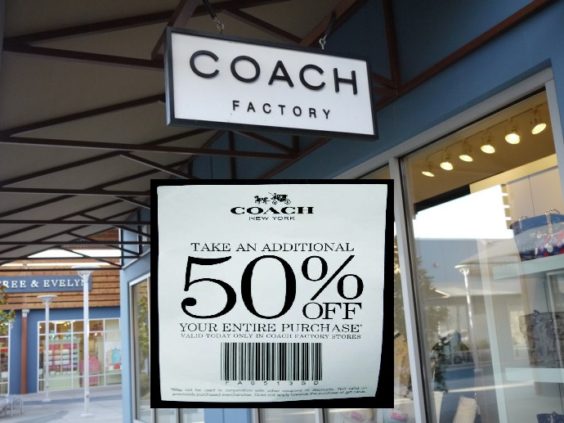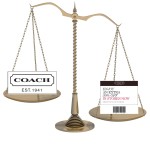
Imagine if you walked into your favorite store and were handed a coupon for 50% off your entire purchase. It would probably make you pretty happy. Now imagine you were handed a 50% off coupon every time you walked into that store. You’d probably be ecstatic.
But one Ohio woman wasn’t. When she found out one particular store was giving out half-off coupons to every customer, every day – she sued.
The dispute originated more than three years ago, when shopper Julie Pattie visited a Coach outlet store in Aurora, Ohio. The maker of designer handbags, shoes, wallets and other fashion accessories generally doesn’t do coupons in its flagship stores. But it offers them freely and frequently for shoppers at its Coach Factory outlet stores.
So freely, in fact, that Pattie says she was handed a coupon the moment she walked in the door. “Take an additional 50% off your purchase,” read the coupon (pictured above). “Valid today only in Coach Factory Stores.”
Half off everything? Today only? Pleased with her good fortune, and hearing the clock ticking on that coupon that was set to expire at the end of the day, Pattie started shopping. She bought an unspecified amount of merchandise, got her 50% off, and went happily on her way.
Happily, that is, until she learned that shoppers who showed up the next day got a 50% off coupon that was also “valid today only”. In fact, her lawsuit alleges, Coach “has been distributing these coupons nearly every day in its factory stores.”
So why would that be a problem, and why would Pattie choose to sue?
By discounting everything 50% for nearly everyone who shopped in its stores, the discounted prices essentially amounted to Coach’s regular prices, Pattie’s lawsuit alleges, and the “savings” represented by the coupon were just an illusion. “The ongoing, constant sale created a situation where the prices of Defendant’s products were never actually discounted but were, in fact, Defendant’s regular prices for these products,” the suit reads.
And that, the lawsuit says, is a violation of Ohio state law that brands it a deceptive practice if a retailer claims “that a specific price advantage exists, if it does not.”
The Federal Trade Commission has much more to say on the subject. “One of the most commonly used forms of bargain advertising is to offer a reduction from the advertiser’s own former price for an article,” state the FTC’s guidelines against deceptive pricing. If the former price is “fictitious”, then “the ‘bargain’ being advertised is a false one; the purchaser is not receiving the unusual value he expects. In such a case, the ‘reduced’ price is, in reality, probably just the seller’s regular price.”
That generally applies to ads or price tags that list a “former price” and a “sale price”. The “former price” can’t simply be made up, to suggest a large discount – the FTC says it must be “the actual, bona fide price at which the article was offered to the public on a regular basis for a reasonably substantial period of time.” In Coach’s case, the “former prices” were indeed actual prices that were charged to anyone who didn’t have, or use, a coupon. Pattie’s argument is that the coupons were handed to every customer, virtually every day, so essentially no one ever paid full price. And that, she claims, makes Coach’s “regular prices” fictitious.
Coach argued that Pattie “only assumes that the products were not discounted, without any basis to make the assertion.” It moved to dismiss the case, but a federal judge refused the motion last week, allowing the case to proceed.
Pattie’s lawsuit seeks the actual discount she believes she should have received. So if 50% off was Coach Outlet’s “regular” price, she wants 50% off that amount. The suit also seeks class action status, on behalf of other Coach Outlet shoppers who were similarly affected.
And you know what that means – a likely coupon settlement. Class action lawsuits against retailers accused of wronging their customers often end with a big payday for the plaintiffs’ lawyers, and discount coupons as compensation for the class members.
So to settle her case that Coach Factory gives out too many coupons, Pattie may unintentionally end up forcing Coach to give out more coupons.
That oughta teach them!
Background image source: Flickr/bfishadow











Oh Paleeeze! She obviously has nothing better to do and no money, to feel the need to sue companies. This makes her look like a bumbling idiot and is sue happy. This is what humans are resorting to when they can’t get their own lives together. Sad.